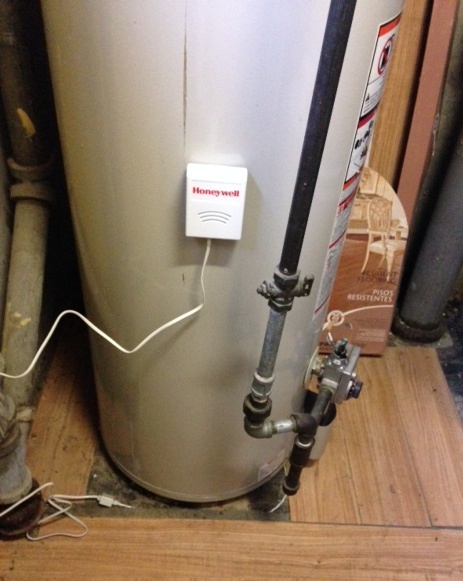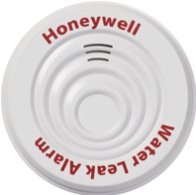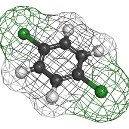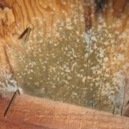Find a pre-screened local mold removal specialist Free Estimate
Find a Mold Specialist Now
Click or Call, Toll-Free 24/7
Water Leak Sensors
Water leaks are a common plumbing problem in homes and a water leak sensor can help you catch a leak when it first begins, thus preventing costly damage to your home. Otherwise, plumbing leaks under sinks, around hot water heaters and in many other areas often go undetected for quite a while and in that time serious water damage can occur.
In addition to damaging your home, water leaks that go undetected for a while can lead to the growth of toxic mold. Mold often spreads rapidly from one area of the home to other areas and can end up costly thousands of dollars to remove. In the meantime, mold puts you at risk for numerous health problems, including respiratory disorders and infections, allergic reactions, migraines, muscle and joint pain, and even digestive problems. You can protect your home and your health by installing water sensors in leak-prone areas.
Here is more on the health dangers of mold exposure.
How a Water Leak Alert Works
It’s similar to a smoke detector, which has an alarm that goes off if there is smoke in your home. Instead of smoke, though, water leak sensors detect the presence of water. Most models have an audible alarm to alert you to leaks. Some models can also be programmed to alert you by text message or email if a leak occurs, which can be especially useful if a leak develops while you’re not at home or away on vacation. Some can even be connect to “smart home” systems and automatically shut off the water valve to prevent water damage when a leak is detected. A simple detector with an audible alarm works well enough for many homeowners, though, and is affordable even for those on a budget.
Where Should You Put a Water Leak Sensor?
 Water Leak Sensor for Hot Water Heater
Water Leak Sensor for Hot Water HeaterYou can install a water leak detector anywhere that leaks are likely to occur. Common locations include near washing machines, by hot water heaters, by refrigerators with ice and water dispensers, under sinks, near toilets and near humidifiers. These are also common areas for household mold.
We especially recommend installing water leak detectors in areas where you might not notice a leak when it first begins. For instance, if you clean your bathroom regularly, you’ll probably notice a leak behind your toilet. If you do laundry frequently, you’ll probably notice a leak near your washing machine before it gets too bad. If your hot water heater is in the basement or some other out-of-the-way place, though, you might not realize it’s leaking for some time. If you don’t look under your kitchen sink often, you might not notice a leak there until quite a bit of water damage has occurred. Protect yourself by installing sensors in these out-of-the-way areas.
You can install as few or as many detectors as you need in your home, based on your specific needs. Many models are quite reasonably priced and they are easy to install, even if you’re not particularly handy.
Recommended Water Leak Sensors
There are many different water sensors on the market, all with different features, and it can be a bit confusing to choose the right ones for your home. We have a couple of favorites we can recommend to you.
For a water leak detector under sinks or near the humidifier in your central heating system, we recommend the Honeywell RWD21 Water Leak Alarm. It’s affordable, easy to install and detects water only 1/16 of an inch deep. To learn more, just follow the link.
And for a water leak sensor around your hot water heater or near your washing machine or dishwasher, we recommend the RWD42 Water Defense Water Sensing Alarm from Honeywell. It has a four-foot sensing cable so it doesn’t just detect water in one small spot. It’s reasonably priced and easy to install.
Free Home Inspection By A Mold Removal Specialist
Search This Website

Recent Articles
-
See Our 5 Recommended Mold Removal Companies in Covington, KY
Apr 16, 25 12:59 PM
-
See Our 5 Recommended Mold Removal Companies in Wheaton, IL
Jun 20, 24 10:33 AM
-
See Our 5 Recommended Mold Removal Companies in Aberdeen, SD
Oct 08, 21 04:05 PM



